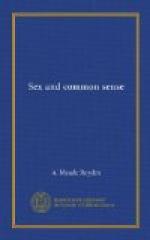It is true that many marriages would not have taken place, and had much better not have taken place, if there had been greater knowledge: but we have yet to learn what greater knowledge can do even without experiment. Hitherto we have gone to the opposite extreme and buried all that belongs to sex not in a fog of ignorance only, but under a mountain of hypocrisy and lies. Let in the light, and see if we cannot do better! And though it is true that some things cannot be known by any amount of teaching, and wait upon experience, yet I submit that the essential experience is realized only when it is believed to be the expression of an undying love—a gift and not a loan.
Let me say one last word on the solution to our moral difficulties proposed by those who affirm for every woman “the right to motherhood.” This claim is based on the belief that the creative impulse is more, or more consciously, present in the sexual nature of a woman than of a man, and that, in consequence, the satisfaction of that impulse is to a great extent the satisfaction of a need which makes the disproportionate number of women in any country a real tragedy. It is impossible to generalize with any degree of confidence about the sexual nature of either man or woman in our present state of crude and barbarous ignorance; but I am inclined—very tentatively—to agree that this generalization is correct, and that the creative impulse is an even stronger factor in the sexual life of women than of men. I realize the cruelty of a civilization in which war and its accessories create an artificial excess of women over men, and in consequence deprive hundreds of thousands of women of motherhood. I do not think I underestimate that cruelty or its tragic consequences. I admit the “right” of women to the exercise of their vocation and the fulfilment of their nature.
But I affirm that those who base upon this claim the right to bring children into the world, where society has made marriage impossible, are not moved to do so by the instinct of motherhood. No, no, for motherhood is more than a physical act; it is a spiritual power. Its first thought is not for the right of the mother but of the child. And what are a child’s rights? A home—two parents—all that makes complete the spiritual as well as the material meaning of “home.” I do not believe that there is any woman who is the mother of young children, and a widow, who does not daily realize how irreparable is the loss sustained by the fatherless. War perhaps has inflicted that loss upon them; it is one of the iniquities of war. And though the mother tries all she can—yes, and works miracles of love to make herself all she can be to her child, that loss cannot wholly be made up. I speak with intensity of conviction on this point, for I have myself a little adopted child—orphaned of both parents—in my home. I never see other children with their parents without realizing what she has lost not only in her mother but her father. There is needed the different point of view, the different relationship, bringing with it a fuller and a richer experience of life. What woman that hast lost her husband does not realize the truth of what I say?




